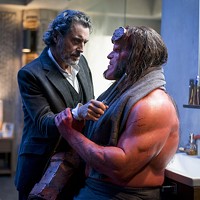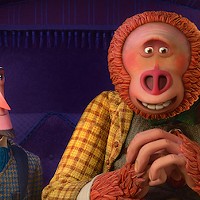

A substantial number of British costume dramas focus on the efforts of a corseted beauty to land a husband to call her own. These tales generally end on a "Happily Ever After" note, but The Duchess, based on a true story (chronicled in Amanda Foreman's book Georgiana: Duchess of Devonshire), begins where the others end and takes matters down a darker route: What if the man you snag turns out to be a complete lout?
That's the central storyline establishing The Duchess (opening in Charlotte Oct. 10 rather than the initially announced Oct. 3), which hands Keira Knightley another plum leading role and serves as yet another example of how Ralph Fiennes' brooding brand of acting can be successfully employed for all manner of characters. Knightley stars as Georgiana, who, as a teenage girl in 1774, is entered by her mother (Charlotte Rampling) into a marriage with the Duke of Devonshire (Fiennes). Georgiana soon discovers that the Duke's only interest in her is that she produce a male heir, so after she gives birth to a couple of girls, he loses complete interest and embarks on an affair with her best friend, Lady Elizabeth (Hayley Atwell). For her part, Georgiana keeps busy in her role as a society trendsetter (it's no surprise to learn that Princess Diana was a direct descendant), but she eventually finds herself contemplating an illicit romance with her longtime acquaintance, rising politician Charles Grey (Dominic Cooper).
The Duke commits some monstrous acts during the course of the film, but it's a credit to the performance by Fiennes as well as Saul Dibb's direction that the character never emerges as a dull, one-note villain but rather an emotionally stifled man whose Neanderthal brain can't quite grasp certain aspects of civility and respect. Likewise, Lady Elizabeth is revealed as far more than merely a spouse-stealer, and Atwell does an exemplary job of insuring her character remains the tenuous connective tissue between the Duke and the Duchess. As for Knightley, she's establishing herself as England's go-to girl for this sort of period epic: A bright and sunny presence in Pride and Prejudice (albeit used far less effectively in Atonement), she's given greater depths to explore in this picture. She doesn't disappoint.
THERE'S A SCENE in Miracle at St. Anna in which a light bulb mysteriously (to the character, not to us) flickers back to life, and the sequence is staged in such a manner that it feels as if director Spike Lee is paying tribute to Federico Fellini, that Italian maestro of both whimsical visions and self-reflective filmmaking. Alas, that moment passes, and it no longer becomes clear exactly what Lee is honoring with this baffling motion picture.
Certainly, by orchestrating this screen version of James McBride's novel (scripted by the author himself), Lee wants to pay tribute to the black soldiers who served this country during World War II. But a more linear narrative might have helped him accomplish that goal. Miracle at St. Anna turns out to be a clusterfuck of good intentions crossed with clunky storytelling, opening and closing with a contemporary (read: 1983) framework that's supposed to infuse the story with a heady mystery. But it doesn't take long for viewers to crack the case, meaning that all of this footage (totaling at least a half-hour of the film's 150-minute running time) could have been excised with no harm, no foul.
The flashback portion of the movie finds four African-American soldiers -- pensive 2nd Staff Sergeant Stamps (Derek Luke), swaggering Sergeant Cummings (Michael Ealy), sensible Corporal Negron (Laz Alonso) and sweet, simpleminded Private 1st Class Train (Omar Benson Miller) -- stranded in a Tuscan village in Nazi-occupied territory. The soldiers' white commander (Randy and the Mob's Walt Goggins, again playing not merely a stereotype of a good ole boy but a stereotype of a stereotype) can't be counted on for support from his safety zone miles away, so the quartet take it upon themselves to protect the villagers as well as themselves. This in turn leads to underdeveloped storylines involving Italian partisans, supernatural intervention and, worst of all, an ongoing feud between Stamps and Cummings as both men vie for the attention of a shapely villager (Valentina Cervi, trapped in an impossible madonna/whore role).
Despite his personal commitment to the material, Lee rarely blesses this picture with his trademark style, an expression of cinematic prowess that enlivens even his clunkiest films. On the contrary, there's no moviemaking miracle at work here, just a half-baked project that might be Lee's biggest disappointment to date.
AFTER THE BACK-TO-BACK HELMING of two excellent motion pictures -- City of God and The Constant Gardener -- Fernando Meirelles now goes for the gold (Oscar?) with his adaptation of Jose Saramago's Nobel Prize-winning novel Blindness.
In a modern society in which people have become more disconnected from each other than ever before, it generally takes a crisis of epic proportions to either unite or divide the populace. In this film's unnamed city (the country and characters similarly go unnamed), the disaster is a lack of vision that affects a significant number of citizens. Since it's not what we assume to be normal blindness -- the victims state that all they see is white, not black -- the afflicted are quarantined, and if the government knows what's behind the illness, they're not revealing anything.
One of those infected is a doctor (Mark Ruffalo), who's then ordered to a containment facility that will soon be harboring others who have been struck blind. The doctor's wife (Julianne Moore) still retains her eyesight, but not wanting to be apart from her husband, she feigns blindness in order to travel with him. In a variation on the theme that "in the country of the blind, the one-eyed man is king," the wife turns out to be a powerful figure in the ward, as her vision allows her to better help those around her. This especially comes in handy when a man (Gael Garcia Bernal) from another ward declares himself "king" and will only allow access to the site's rationed food supply in exchange for jewelry and, in an especially disturbing sequence, sexual favors from the women.
Given the material's expansive canvas, the film ultimately feels too claustrophobic in its scope, and while I imagine the source material (which I haven't read) manages to draw up some interesting parallels between the disease and our society's inability to "see" what's around us, the film merely operates on one plateau, drawing more commonplace comparisons to other literary sources like Lord of the Flies and Animal Farm. Despite strong performances and a few compelling scenarios, it's plain to see that Blindness doesn't quite measure up to expectations.
DIANE LANE and the Tuscan countryside prove to be a more dynamic duo than Diane Lane and the Outer Banks, an assertion that immediately becomes clear when placing Under the Tuscan Sun and Nights in Rodanthe side by side. Neither film, of course, could be accused of basking in originality, but the former at least made the most of its setting and its star, resulting in a winning romantic comedy whose love-struck spirit rubbed off on audience members eager to lap up its sense of joie de vivre. The coastal-Carolina-shot Rodanthe, on the other hand, starts off well as Tuscan Sun's more serious-minded cousin, but it eventually sinks under the weight of the shameless plot devices thrust upon it by author Nicholas Sparks and adapters Ann Peacock and John Romano.
Lane, teaming with Richard Gere for the third time (following 1984's The Cotton Club and 2002's Unfaithful, the latter for which she deservedly earned a Best Actress Oscar nomination), plays Adrienne Willis, who agrees to look after her best friend's (Viola Davis) beachfront inn at the same time that her philandering husband (Christopher Meloni) is begging her to let him come back. Gere co-stars as Paul Flanner, a doctor brooding over a minor surgery procedure that went tragically wrong. As the only two people stuck at the inn, Adrienne and Paul open up to each other and gradually fall in love.
For a while, Nights in Rodanthe works as a mature and even touching drama -- look for a powerful appearance by Scott Glenn as a grieving widower -- but then the melodramatic devices take over with the force of a hurricane. And speaking of hurricane, the second-act emergence of this force of nature is but one of the hoary aspects that sink the production, along with a sour twist that is as expected as it is defeatist. Astonishingly, acclaimed Broadway director George C. Wolfe (Angels in America) chose this project to mark his big-screen debut, but the end result is strictly water-logged.
THE PERIL OF ENCROACHING TECHNOLOGY has been a cinematic mainstay at least since Stanley Kubrick allowed HAL to temporarily get the upper hand in 1968's 2001: A Space Odyssey (film purists can feel free to go even further back, to Fritz Lang's 1927 Metropolis), but rarely has this intriguing concept been presented as daftly as in the new thriller Eagle Eye.
Executive-produced by Steven Spielberg (whose own techno-infused thriller, the superb Minority Report, bests this on every imaginable plane), this tiresome action yarn finds slacker Jerry Shaw (Shia LaBeouf) and single mom Rachel Holloman (Michelle Monaghan) drawn into what appears to be a terrorist strike against the United States. Initially strangers, they find themselves working together after each one receives threatening phone calls from a woman who orders them to carry out her instructions ... or else. The owner of the disembodied voice seemingly has control over every electronic device in sight, as she's able to manipulate traffic lights, power lines, subway cars, and even cell phones. Meanwhile, hot on Jerry's trail is government agent Thomas Morgan (Billy Bob Thornton, coming off as the dim-witted cousin of Tommy Lee Jones' sharp tracker in The Fugitive), who can't decide whether the kid is really a terrorist or just a dupe who's been set up.
Even allowing for the big twist that explains the villain's identity, this movie requires a greater suspension of disbelief than might be humanly possible. If Jerry perishes during the course of his misadventures, then the assignment's a bust, yet the caller repeatedly places him in death-defying situations (I especially liked his leap-before-you-look jump from a speeding train). A faster running time might have helped us overlook the gaping idiocies, but the film is packed with repetitive -- and poorly edited -- vehicular chases that bloat this to a punishing two hours.
But pay heed to the movie's warning: Technological advancements might indeed become a concern in the future, especially if they allow for greater mass production of duds like this one.
THE DUCHESS
***
DIRECTED BY Saul Dibb
STARS Keira Knightley, Ralph Fiennes
MIRACLE AT ST. ANNA
**
DIRECTED BY Spike Lee
STARS Derek Luke, Michael Ealy
BLINDNESS
**1/2
DIRECTED BY Fernando Meirelles
STARS Julianne Moore, Mark Ruffalo
NIGHTS IN RODANTHE
**
DIRECTED BY George C. Wolfe
STARS Richard Gere, Diane Lane
EAGLE EYE
*1/2
DIRECTED BY D.J. Caruso
STARS Shia LaBeouf, Michelle Monaghan
To see select trailers from the reviewed films, go to www.qccltv.com.


